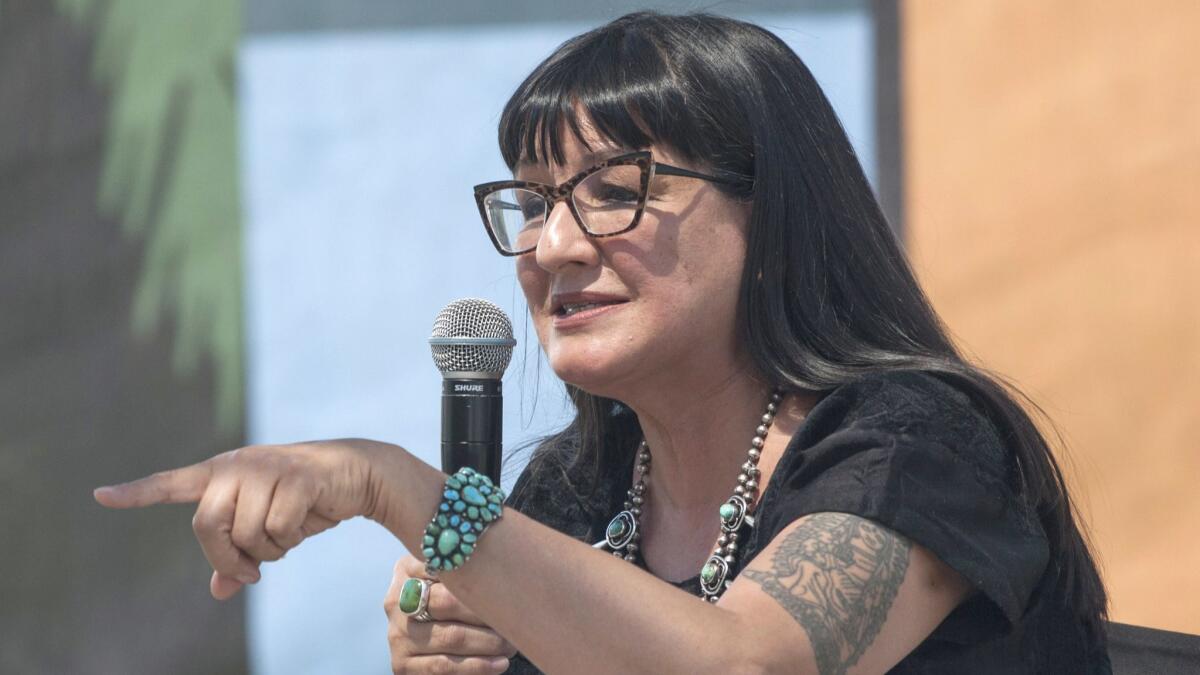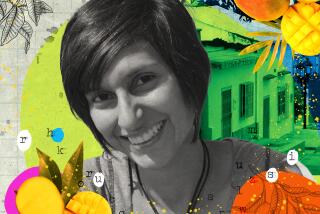Sandra Cisneros raises up Frida Kahlo and other women at L.A Times Festival of Books

Sandra Cisneros sits down for an interview while attending the L.A. Times Festival of Books.
When Sandra Cisneros stepped onto the main stage at the L.A. Times Festival of Books on Saturday afternoon, she greeted the audience in Spanish first, with a microphone in one hand and a violet hand fan in the other.
“Gracias a todos! Bienvenidos!”
For the monolingual, she translated it to: “Hello, thank you to all and welcome! And get with the program. It’s the new millennium. You need to learn more than one language. Any other language will do, but in this part of the world it’s very good to have Spanish.”
Cisneros, the writer who’s built a home in the canon of contemporary American literature and in the imaginations of readers, spoke with Times staff writer Esmeralda Bermudez on USC’s campus.
She made her literary debut in 1980 with the poetry chapbook “Bad Boys.” Four years later, she published “The House on Mango Street,” a coming-of-age novel about a teenage Mexican American girl in Chicago. The novel, translated into more than 20 languages, has sold millions of copies.
L.A. Times Festival of Books is this weekend. Here’s everything you need to know before you go »
Some of her other books include a short-story collection, “Woman Hollering Creek,” the novel “Caramelo,” a picture book called “Have You Seen Marie?” and the memoir “A House of My Own: Stories from My Life.”

The 64-year-old, who said she feels she is in the strongest period of her life, has racked up multiple prestigious awards and fellowships. Her most recent accolade is the 2019 International PEN/Nabokov Award for Achievement in International Literature.
During Saturday’s conversation, Cisneros discussed past work as well as her latest publication “Puro Amor,” a bilingual chapbook, illustrated with Cisneros’ original line drawings. The short story is based on Frida Kahlo and Diego Rivera with characters named “Mister and Missus Rivera,” who live in “la casa azul” (the blue house) with macaws, monkeys, iguanas and hairless dogs. The chapbook is an imaginative look into their daily life and the pure love of their pets.
RELATED: Full Festival of Books coverage »
Like Missus Rivera, Cisneros also feels strongly about her dog.
“Things of the spirit — trees, clouds, dogs, cats — they would nurture me much better than the men who saw me as a sexual object, who destroyed a part of me. It took me a long time to heal and become aware,” Cisneros said.
Elena Poniatowska, an author whom Cisneros calls the Mexican grand dame of letters and her mentor, influenced her choice to center the book on Kahlo. In a lecture, Poniatowska pointed out many noteworthy women who are rarely known.
“There is a whole generation [of women] post revolution. Frida was one of many wild, brave, artistic women,” Cisneros said.
During the audience Q&A portion, a high school sophomore asked Cisneros how her work is necessary and relevant to women today.
“Women in 1920s and ’30s Mexico were much more outrageous than women are now. We need to read and find our women’s history, our Latina history,” Cisneros said. “If we knew our history, we would be very empowered. I try in the work that I do to shed a light on historical figures and people that I’m interested in.”
The L.A. Times Festival of Books continues through Sunday on the USC campus.
More to Read
Sign up for our Book Club newsletter
Get the latest news, events and more from the Los Angeles Times Book Club, and help us get L.A. reading and talking.
You may occasionally receive promotional content from the Los Angeles Times.









